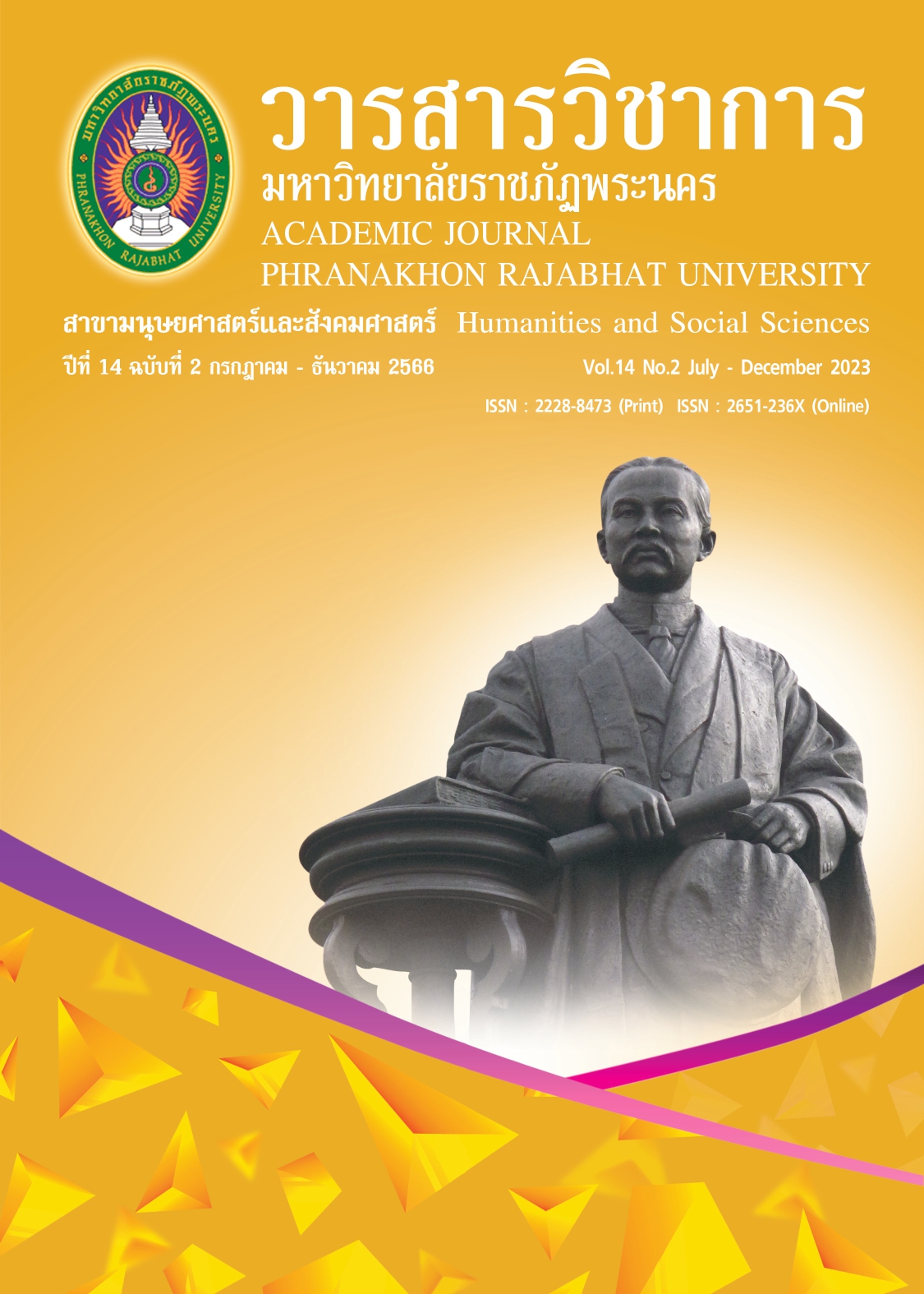A COMPARISON OF COOPERATITVE EDUCATION LEARNING ATTITUDES BETWEEN STUDENTS OF KING MONGKUT’S UNIVERSITY OF TECHNOLOGY NORTH BANGKOK AND KING MONGKUT’S INSTITUTE OF TECHNOLOGY LADKRABANG
Keywords:
Attitude, Cooperative Education, Perception, Learning Abilities, Learning ProcessAbstract
The objectives of this research were: 1) to study the level of cooperative education learning attitude, perception, learning abilities, provision of learning support, preparation for cooperative education, and teaching and learning processes, categorized by university, 2) to examine the correlation between perception, learning abilities, provision of learning support, preparation for cooperative education, and teaching and learning processes affecting cooperative education learning attitude, 3) to compare personal factors and cooperative learning attitude among the students at King Mongkut's University of Technology North Bangkok and King Mongkut's Institute of Technology Ladkrabang, and 4) to compare the opinions of students from the two institutions toward the cooperative education learning. The population consisted of 8,080 third-year students from both King Mongkut's University of Technology North Bangkok and King Mongkut's Institute of Technology Ladkrabang. The sample size was determined as 382 participants, selected through random purposive sampling. This research utilized an online questionnaire to gather data. A total of 309 completed questionnaires were returned. Data were analyzed by using frequency, percentage, mean, standard deviation, Pearson's correlation, and one-way ANOVA analysis of variance. In cases where differences were found, intricate comparisons were conducted using the Sheffe' method, employing computerized statistical programs. The findings indicated that:
1) The students from both institutions exhibited high level of cooperative learning attitude, perception, learning abilities, provision of learning support, preparation for cooperative education, as well as teaching and learning processes across all aspects.
2) The perception, learning abilities, provision of learning support, preparation for cooperative education, and teaching and learning processes were positively correlated with their attitudes towards cooperative education at a moderate level.
3) The comparative results of personal factors and attitudes towards cooperative education of the students from both universities in the aspects of gender, age, monthly income, and affiliated university showed no differences in every aspect, and
4) The comparison of opinions on cooperative education between students from both universities revealed that students from King Mongkut's University of Technology North Bangkok had more positive opinions towards cooperative education than ones from the other university.
References
Arrosagaray, M., González-Peiteado,M., Pino-Juste, M. & Rodrígues-López, B. (2019).A
comparative study of Spanish adult students’ attitudes to ICT in classroom, blended
and distance language learning modes. Computer & Education 134, 31-40. (In Thai)
Bontchev, B., Vassileva, D. Aleksieva-Petrova, A. & Petrov, M. (2018).Playing styles
base on experiential learning theory. Computer in Human Behavior, 85, 319–328.
(In Thai)
Chaisansuk. D., Yongsorn, J. & Ponatong, J. (2017). The Study of Course The of Teaching
Cooperative Education of Rajamangala University of Technology in The Central
Region.ARU Research Journal, 4(3), September. (In Thai)
Chen, S., Du, H., Wang, S. & Yang, L. (2022). Understanding EFL reading anxiety in relation to learning motivation, attitudes and strategies for Chinese and Spanish undergraduates. System 108,102842, 1-13.
Doherty, O., McGreevy, D.P. & Peason, G. (2017). The importance of learning theory and equitation science to the veterinarian. Applied Animal Behaviour Science 190, 111 – 122.
Dinah de AraÚjo, P., Coelho AraÚjo, M.W., Patarata, L. & Fraqueza, J.M. (2022). Understanding the main factors that influence consumer quality perception and attitude towards meat and processed meat product. Meat Science 193, 108952, 1-12.
Gaewgoontol, N. (2021). Integrating cooperative education and nursing practicum to enhance transcultural nursing competency. Retrieved from http://sutir.sut.ac.th:8080/jspui/handle/123456789/8814. [2021, 10 June.] (in Thai).
Hair, J.F., Black, W.C., Babin, J., & Anderson, R.E., & Tathan, R.L. (2006). Multivariate data analysis(6th).USA., Upper Saddle River, NJ: Prentice-Hall.
Hinkle, D.E, William, W. and Stephen G. J. (1998). Applied Statistics for the Behavior Sciences. 4thed. New York : Houghton Mifflin.
Moorhead, G. & Griffin, W.R. (2014). Organizational Behavior Managing People and Organizations. Ninth Edition, China.
McLean, N.A. & Christensen, W.J. (2017). The application of learning theory in hose training. Applied Animal Behaviour Science, 190,18-27.
Murnane, S.K. , Augustine, M.J. & Marshall, L.L. (2022). Student pharmacists’ attitudes, perceptions, and knowledge regarding opioid use, misuse, and overdose: Four years of data. Currents
in Pharmacy Teaching and Learning, Article In Press, 1-7.
Nimjit, S., Tungkaitsilpha, A. & Yooyen, J. (2017). Enterprise’s expectations for Students in Cooperation Education Project and Internship Program at faculty of business Administration, Rajamangala University of Technology Thanyaburi. Journal of Marketing and Management , 4(1), January – June, (In Thai)
Office of the Higher Education Commission (2017). Thailand Education Scheme in Brief
– 2036. Retrieved from https://www.onec.go.th [2022, 13 Feb.], (in Thai)
Plangruksa, W., Supakitsuwannakun, N., Srisuk, K., Tongrueng, A., Chanbuala, K., Faikhoksung, P.
& Charoennet, C. (2021). Student development factors and preparation by the learning support of the Business Administration Program in Business Computer.Interdisciplinary Management Journal Faculty of Management Science, Buriram Rajabhat University, 5(1), January – June, (In Thai)
Promarach, N. (2022). Learning Support Management System: ServiceSupporting Education in Communication Arts of Universities in Chiang Mai Province. Journal of Mass Comm Faculty of Mass Communication Chiang Mai University, 10(1), Jan-June, (In Thai)
Tirakanan. S. (2006). Statistics Responds to the Question of What Science: an Approach to Action. Bangkok, Chulalongkorn University Printing House. (In Thai)
Thai Association for Cooperative Education. (2021). Report on the status of coeducational education within the country and internationally of international institutions. Retrieved from https://tace.sut.ac.th/tace/download/document/report.pdf [2022, 15 March.]
Völlinger, A.V. & Supanc, M.(2020). Student teachers’ attitudes towards cooperative learning
in inclusive education. European Journal of Psychology of Education, 35, 727–749.
Wongpinpet, P.(2018).Individual Behavior in the Organization. Bangkok, Textbook Production Center of King Mongkut's University of Technology North Bangkok. (In Thai)
Watcharakate, R. & Sookkumnerdterasut, T. (2020). Factors Affecting on Cooperative
Education Learning Outcomes of Students in the Major of Information Technology
from HED Net (Upper Central Region). Electronic Journal of Open and Distance
Innovative Learning, 10(2), July – Dec. (In Thai)
Downloads
Published
How to Cite
Issue
Section
License
Copyright (c) 2023 Academic Journal Phranakhon Rajabhat University

This work is licensed under a Creative Commons Attribution-NonCommercial-NoDerivatives 4.0 International License.
"บทความวิชาการในวารสารฉบับนี้ ถือเป็นความรับผิดชอบของผู้เขียนเท่านั้น"
สงวนลิขสิทธิ์ตามพระราชบัญญัติลิขสิทธิ์




